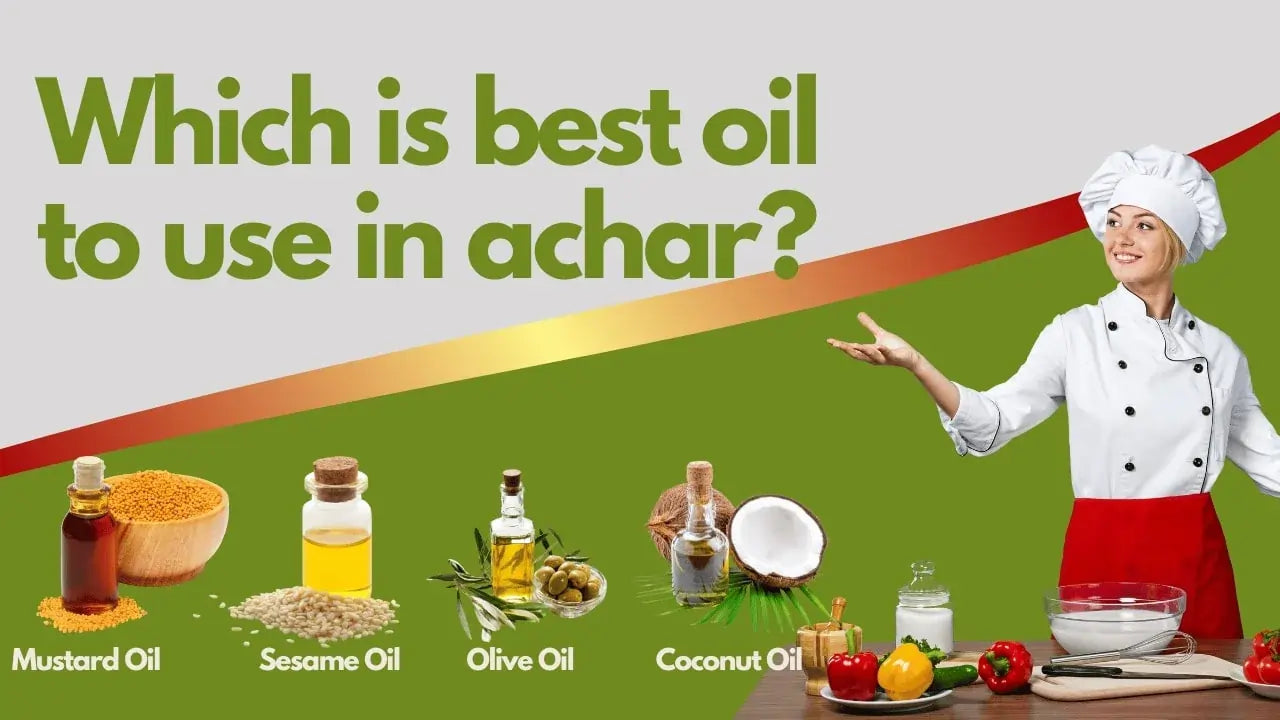Pickles or achar are an essential part of Indian food. They add unique flavors to meals, even for the simplest dishes. But did you know that the oil used in making achar plays a critical role—not just in taste, but also in preservation, texture, and health benefits?
According to a report by the Indian Food Processing Industry, India produces over 4.1 million tons of pickles annually, with mustard oil leading as the most commonly used oil in traditional recipes. However, with the growing trend toward health-conscious eating, there’s an increasing demand for alternative oils like sesame oil and olive oil in modern pickle-making.
If you’re wondering which oil is best for achar, this article breaks it down for you by examining popular options, their benefits, and suitability for different types of pickles.
1. Mustard Oil: The Timeless Classic
Mustard oil is hands-down the most widely used oil in Indian pickles, especially in the northern and eastern parts of India. Its strong, pungent aroma and healthy flavor make it a top choice for preserving traditional achar like mango, lemon, and mixed vegetable pickles.
Why mustard oil works well:
- Preservation: Mustard oil contains natural antimicrobial properties that prevent spoilage.
- Flavor: Its bold and spicy undertone enhances the pickle's taste.
- Texture: It coats the ingredients well, ensuring even distribution of spices.
Health Note: Mustard oil is rich in monounsaturated fats and omega-3 fatty acids, making it a relatively heart-friendly choice.
2. Sesame Oil: The Southern Favorite
In southern India, sesame oil (also known as gingelly oil) is a popular choice for making pickles like Andhra-style spicy mango or tamarind pickle. Its nutty flavor complements the fiery spices typically used in South Indian achar recipes.
Why sesame oil works well:
- Stability: Sesame oil has a high smoke point and is less prone to rancidity.
- Rich Taste: It adds a deep, nutty richness to the pickle.
- Health Benefits: Packed with antioxidants, sesame oil has anti-inflammatory properties and is good for digestion.
3. Olive Oil: The Modern Twist
With health trends on the rise, olive oil is making its way into contemporary pickle recipes. While it may not have the traditional essence of mustard or sesame oil, it works well for lighter pickles like garlic, carrot, or Mediterranean-style pickles.
Why olive oil is gaining popularity:
- Health Benefits: Olive oil is a rich source of healthy fats and antioxidants.
- Neutral Flavor: It allows the spices and vegetables to shine without overpowering the taste.
- Global Appeal: Ideal for fusion pickles that mix Indian and Western ingredients.
Pro Tip: Use extra virgin olive oil only for pickles meant to be refrigerated, as it’s less stable at room temperature.
4. Coconut Oil: A Regional Favorite
Coconut oil is occasionally used in coastal regions like Kerala for pickles such as prawn achar or mango pickle. It has a distinct aroma and flavor that pairs beautifully with the region’s cuisine.
Why coconut oil works well:
- Flavor: Adds a mild sweetness that balances spicy pickles.
- Health Factor: Rich in medium-chain triglycerides (MCTs), coconut oil boosts metabolism.
- Natural Preservative: Contains lauric acid, which has antimicrobial properties.
Drawback: Coconut oil solidifies in cooler climates, so it’s best used in warmer regions.
Which Oil is the Best?
The best oil for achar depends on personal preference, regional tradition, and health considerations. If you’re looking for:
- Authenticity: Go for mustard oil or sesame oil.
- Health benefits: Olive oil is your go-to.
- Unique flavors: Experiment with coconut oil or even blended oils.
At tasty tongue, we believe in preserving the age-old essence of pickles while embracing modern trends. That’s why our artisanal pickles are made using carefully selected oils like mustard to maintain both tradition and quality.
Tips for Choosing the Right Oil for Your Pickle
- Check for freshness: Always use fresh, high-quality oil to avoid rancidity.
- Be mindful of flavor: Choose oil that complements the spices and ingredients.
- Health-conscious choice: Opt for oils with good fats and fewer trans fats.
- Preservation: Ensure the oil forms a proper layer over the pickle to keep it fresh for longer.
In Conclusion
Whether you stick to the bold flavors of mustard oil or experiment with the health benefits of olive oil, the choice of oil can make or break your pickle. The key lies in balancing tradition, taste, and health. So, the next time you’re making achar or buying it, remember: the oil you choose is more than just an ingredient—it’s the soul of the pickle.
Looking to try authentic, oil-rich pickles crafted with care? Explore the delicious range at tasty tongue and experience the perfect blend of flavors, oils, and spices in every jar!



